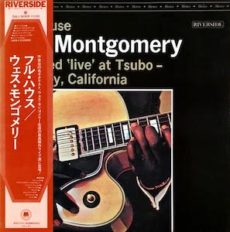
Requisites
Full House ~ Wes Montgomery | By Eddie Carter
In a game of poker, a full house is a five-card hand containing three-of-a-kind and a pair of another. The three-of-a-kind in this morning’s discussion to begin April is a brilliant trio that at the time was Miles Davis’ rhythm section but also a spectacular group in their own right. The pair is a little giant who was diminutive only in height but possessed a robust sound and an extraordinary guitarist who’d taken the jazz world by storm with his playing. Full House (Riverside RLP 434/RS 9434) is a 1962 live date by Wes Montgomery performed with a world-class quartet, Johnny Griffin on tenor sax, Wynton Kelly on piano, Paul Chambers on bass, and Jimmy Cobb on drums. My copy used in this report is the 1974 Victor Musical Industries Japanese Stereo reissue (Riverside SMJ-6069).
The opener, Full House is an original by Wes welcoming everyone inside the club with the quintet’s festive theme. The leader cooks on the first solo with an infectiously happy groove. Johnny comes in next, swinging strongly on the second reading. We’re then treated to a rollicking finale by Wynton punctuated by the rhythm section’s groundwork leading to the climax. I’ve Grown Accustomed To Her Face by Frederick Loewe and Alan Jay Lerner made its debut in the musical, My Fair Lady (1956). This is a trio tune with Wes supported only by Paul and Jimmy. The guitarist approaches the melody and song’s only solo with an intimate beauty and graceful lyricism that’s gorgeously rendered culminating in a tender finale receiving appreciative applause from the crowd.
Blue ‘N’ Boogie by Dizzy Gillespie and Frank Paparelli begins with the ensemble’s vigorous melody. Montgomery begins in good spirits with a lively opening statement, then Kelly shows a masterful hand on the keys. Griffin thrills the listener with utter delight on the next interpretation. Cobb shares an energetic exchange with Wes, Johnny, and Wynton before taking the spotlight himself leading to the ensemble’s reprise and exit. Cariba, the guitarist’s second tune opens Side Two with a positively tropical flavor in the quintet’s theme. Paul lays down some bluesy bass lines on the first solo. Wynton opens the second presentation with exceptionally smooth execution. Griff delivers a good deal of happy excitement in the third reading. Wes adds a pleasant punctuation with a light-hearted, friendly finale.
Come Rain or Come Shine by Harold Arlen and Johnny Mercer premiered in the Broadway musical, St. Louis Woman (1946). Montgomery and the trio pick up the tempo on the introduction and theme. Johnny kicks things off with some exciting blowing. Wes propels the second solo with tasteful playing, and Wynton closes with an eminently enjoyable interpretation before the song’s conclusion. This delightful set concludes with an uptempo cooker by Wes, S.O.S. The ensemble soars collectively in the opening chorus, then Griffin delivers the first solo with a fiery passion. Wes follows with an equally assertive second statement. Wynton adds a bit of effervescent energy to the third reading. Jimmy provides the final fireworks in a conversation with Griff and Wes into the group’s finish.
A few months after the quintet recorded Full House, Tsubo closed, later reopening as The Jabberwock, offering its patrons folk music. It remained open a few more years until the doors closed for good in 1967. This album was produced by Orrin Keepnews and Wally Heider was the recording engineer. Victor Musical Industries has done a fantastic job with the mastering because this reissue sounds incredible with an outstanding soundstage placing the listener in the club with exceptional clarity. If you’re a fan of Wes Montgomery, Johnny Griffin, or Wynton Kelly, I offer for your consideration on your next vinyl expedition, Full House. The music throughout is excellent and there’s superb playing from all hands, making this a perfect title for any jazz library!
~ Come Rain or Come Shine – Source: JazzStandards.com
~ Blue ‘N’ Boogie, I’ve Grown Accustomed To Her Face, The Jabberwock – Source: Wikipedia.org © 2022 by Edward Thomas Carter
More Posts: choice,classic,collectible,collector,guitar,history,instrumental,jazz,music
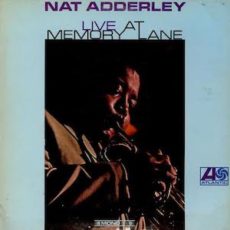
Requisites
Live at Memory Lane ~ Nat Adderley | By Eddie Carter
This morning’s choice from the library is one of my favorite records that always takes me back to my childhood each time it’s on the turntable. Live at Memory Lane (Atlantic 1474/SD 1474) by Nat Adderley is a 1966 release recorded on Halloween night before an enthusiastic audience. Nat is featured on trumpet exclusively with a stellar supporting cast including his brother Cannonball’s rhythm section. Joe Henderson (tracks: A2 to B3) on tenor sax, Joe Zawinul on piano, Victor Gaskin on bass, and Roy McCurdy on drums complete the ensemble. I was thirteen when I first heard it at Record Rendezvous in Cleveland, Ohio and it still delivers all treats and no tricks. My copy used in this report is the original US Mono album.
Side One starts with On My Journey Now, an original by Nat Adderley endowed with the spirit of a sanctified church song. The leader kicks off the melody with a lively energy advancing to an uplifting opening statement. Zawinul follows with an extremely funky performance that’s sure to get your foot stomping to the rhythm section’s contagious beat preceding Nat leading the congregation out. Adderley’s second composition, Fun, is exactly that. It first appeared on Mercy, Mercy, Mercy (1967) with the trio anchoring both brothers. The group heats up the opening chorus, then Joe steps up first to cook with a fiery passion. Nat speaks with bright and brassy enthusiasm next. Zawinul follows with a feisty attack on the closer before the ensemble’s theme comes to a standstill.
Good Old Summertime by George Evans and Ren Shields is a pretty song from Tin Pan Alley. Nat begins the mid tempo melody on mute accompanied by the trio, then continues floating like a cloud over a picturesque landscape with a discretely rich tone. Henderson is equally enchanting on the second statement, and Joe unfolds a simply gorgeous interpretation ahead of Nat’s tender muted climax. Side Two opens with the first of two from Joe Zawinul’s pen, Lavender Woman. Nat begins with a brief introduction, then picks up the pace for the ensemble’s theme. Henderson takes the lead and swings adventurously. Adderley comes after him and perks up our ears on the second solo. Zawinul soars to great heights on an imaginatively conceived and executed finale into the theme’s return.
Painted Desert is simply breathtaking in its lyrical beauty and the ensemble opens with a gorgeous theme. Henderson is in the spotlight first and delivers an exquisitely beautiful reading. Adderley takes the reins next for an emotionally charged interpretation. Zawinul approaches the finish line with a degree of sensitivity that segues into a vivacious presentation, then the quintet reassembles for a final word. Theme by Nat Adderley and Joe Zawinul brings the set and album to an upbeat close. The group takes off on the opening chorus and Henderson, Adderley, and Gaskin (in his only solo) each take a turn to cook. Nat adds the exclamation mark by acknowledging his bandmates and thanking the audience during the closing chorus.
Nesuhi Ertegun supervised Live at Memory Lane and Wally Heider was the recording engineer for the ensemble’s performance. The sound quality is excellent for a fifty-five-year-old release surrounding your sweet spot with great music that’s a fantastic listen. This was Nat’s first live album leading his own group and I wish he’d recorded more as a leader. The quintet swings like crazy with superb musicianship that makes the listener feel he or she is part of the audience enjoying the music. If you’re a fan of live jazz, just becoming acquainted with the music of Nat Adderley, or only know of his work with Cannonball, I invite you to check out Live at Memory Lane on your next viny hunt. It’s a thoroughly enjoyable album deserving of reaching a wider audience!
~ Mercy, Mercy, Mercy (Capitol Records T 2663/ST 2663) – Source: Discogs.com ~ In The Good Old Summertime – Source: Wikipedia.org © 2022 by Edward Thomas Carter
More Posts: choice,classic,collectible,collector,history,instrumental,jazz,music,trumpet
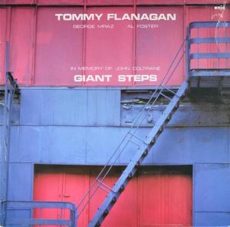
Requisites
Giant Steps (In Memory of John Coltrane) ~ Tommy Flanagan | By Eddie Carter
This morning’s choice from the library was recommended to me years ago because of my love of piano trios. I finally acquired a copy and am pleased to submit it for your approval. Giant Steps (Enja Records 4022) is a terrific 1982 album that’s a loving tribute to John Coltrane by pianist Tommy Flanagan. The tenor saxophonist composed all the tunes on this date and five of them appeared on his album Giant Steps (1960). Here, he’s working with an outstanding rhythm section, George Mraz on bass and Al Foster on drums. My copy used in this report is the original German Stereo release.
Side One opens with Mr. P.C., John’s tribute to bassist Paul Chambers who alongside Flanagan first recorded it with him. After the trio swings in unison on the melody, Tommy constructs the first solo vigorously. George gives an inspired statement next, then Al shares the spotlight with the leader on an energetic exchange into the reprise.
Central Park West is the first of two pretty ballads on the album and was first heard on Coltrane’s Sound (1964). Flanagan starts the song tenderly, then the rhythm section joins him to complete the melody. The pianist handles the opening chorus with great sensitivity and delicacy. Next up is Mraz who provides a brief thoughtful expression, then the pianist reappears for a concise comment preceding a gentle ending.
Syeeda’s Song Flute is Coltrane’s original written for his then ten-year-old daughter and returns the ensemble to an upbeat mood with a collective happy theme. Tommy captures the sheer joy of this tune in the opening statement. George responds with a cheerfully carefree interpretation that bounces along into Al’s zesty brushwork on the third performance. The pianist makes a few final points ahead of the ensemble’s culmination.
Side Two gets underway with Coltrane’s song about his Cousin Mary. The group is in perfect harmony on the melody. Flanagan starts it off with a vivaciously spirited solo that’s sure to have the listener tapping their toes to this irresistible beat. Mraz makes an indelible impression next, and Foster dazzles in an exchange with the leader ahead of the trio’s sprightly climax. Naima is John’s gorgeous tribute to his first wife and the trio opens with a heartfelt melody. Tommy paints a beautiful portrait as soft as an affectionate embrace on the song’s only solo with George and Al supplying the subtle support into an enchanting ending.
Giant Steps completes the album in high spirits from the start of the trio’s brisk theme. Flanagan leads off with an exhilarating reading, then Mraz greets the next solo enthusiastically. Foster and Flanagan share a lively exchange ahead of the closing chorus and finish.
Giant Steps was produced by Horst Weber and Matthias Winckelmann, and the album’s recording engineer was David Baker. The sound quality is excellent with superb fidelity across the highs, midrange, and low end that transports the trio to your listening room vividly. Tommy Flanagan was one of the most admired pianists in jazz and it might be easier for me to tell you who he didn’t play with because his discography is so extensive. Flanagan recorded forty albums as a leader, appeared on over two hundred more as a sideman and his career lasted over fifty years. He passed away on November 16, 2001, at the age of seventy-one. If you’re a fan of jazz piano, piano trios, or are new to the music of Tommy Flanagan, I invite you to seek out Giant Steps on your next vinyl hunt. It’s an exceptional album that’s worth checking out for a spot in your library!
~ Coltrane’s Sound (Atlantic 1419/SD 1419), Giant Steps (Atlantic 1311/SD 1311) – Source: Discogs.com ~ Giant Steps, Naima – Source: JazzStandards.com © 2022 by Edward Thomas Carter
More Posts: choice,classic,collectible,collector,history,instrumental,jazz,music,piano
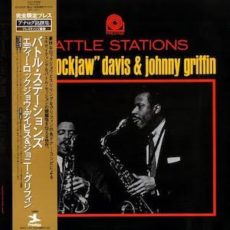
Requisites
Battle Stations ~ Eddie “Lockjaw” Davis & Johnny Griffin | By Eddie Carter
It happened like this; that same night after I listened to The Happy Blues, I decided to turn up the heat with my next selection. That’s what prompted this morning’s choice from the library by tenor saxophonists, Eddie “Lockjaw” Davis and Johnny Griffin. Battle Stations (Prestige PRLP 7282/PRST 7282), hit the stores in 1963 and both horns are anchored by a smokin’ rhythm section, Norman Simmons on piano, Vic Sproles on bass, and Ben Riley on drums. My copy used in this report is the 1993 Japanese Mono reissue (Prestige VIJJ-30008 – PRLP 7282) by Victor Musical Industries.
Side One takes off at a fast clip on What’s Happening by Fletcher Henderson. The quintet speeds through the melody collectively, then Eddie erupts into an energetic opening statement. Norman steps up next with a spirited performance, then Johnny wails for a bit on the third reading. Both saxes move with considerable agility on a vigorous exchange into the quintet’s speedy ending. Abundance by Norman Connors slows the group’s pace just a few notches with a soulful melody in unison. “Lockjaw” goes first and gives a charming performance. Connors takes the reins next for an easy, flowing solo and Griff extends the mood on the finale with a satisfying statement succeeded by the ensemble’s reprise and climax.
If I Had You by Jimmy Campbell, Reginald Connelly and Ted Shapiro is up next. “Lockjaw” leads the rhythm section at a relaxing tempo on the melody and exhibits a simple beauty in the opening chorus. Norman is simply enchanting on the second reading. Johnny adds a delightful depth of emotion to the closing solo complemented by Vic and Ben’s supplement. Johnny Griffin’s 63rd Street Theme begins Side Two at mid tempo with a Latin flavor established by the rhythm section’s introduction and ensemble’s opening chorus. Davis approaches the lead solo with unhurried pacing and inspired lines. Connors packs plenty of feeling into the second presentation, then Griff is very smooth on the closing statement preceding the finale.
Pull My Coat by Richard Evans is a blues that comes to life with a brief bass introduction by Vic preceding the ensemble’s collective theme. Eddie opens anchored by just bass and drums, segueing into a splendid performance with full rhythm. Norman moves leisurely into the second solo with some down-home cooking. Johnny serves some succulent soul food on the closer. The quintet ends the set with a fun original by Babs Gonzales and James Moody, Hey Jim! Connors and the rhythm section opens with a happy introduction that grows into the ensemble’s unison theme. “Lockjaw” gives the first solo some swinging excitement, then Connors rises to the occasion on the second solo. Griffin follows with a perfectly executed statement, then both horns share a final exchange ahead of the group’s exit.
Battle Stations was produced by Esmond Edwards and Rudy Van Gelder was the man behind the dials of the original album. Victor Musical Industries has done a very good job with the remastering of this reissue. The album has an exquisite soundstage through the treble, midrange, and bass that’s excellent. Griff and “Lockjaw” were brilliant when working together and they’ve recorded several great studio and live albums. If you’re in the mood for some swinging Hard-Bop and are a fan of Eddie “Lockjaw” Davis and Johnny Griffin, I invite you to audition Battle Stations for a spot in your jazz library. It’s forty-two minutes of great music from one of the great tenor sax partnerships that’s sure to become one of your favorites!
~ If I Had You – Source: JazzStandards.com © 2022 by Edward Thomas Carter
More Posts: choice,classic,collectible,collector,history,instrumental,jazz,music,saxophone
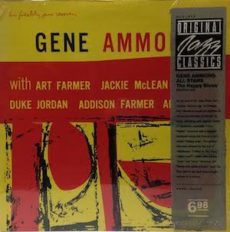
Requisites
The Happy Blues ~ Gene Ammons | By Eddie Carter
A few nights ago, I was in the mood to hear something bluesy while reading and that’s what prompted this morning’s discussion. I looked through the library and came across one of my favorite albums by tenor saxophonist Gene Ammons. It was originally released as Hi-Fidelity Jam Session (1956) but was reissued a few years later as The Happy Blues (Prestige PR 7039). Ammons is supported on this date by an all-star sextet, Art Farmer on trumpet, Jackie McLean on alto sax, Duke Jordan on piano, Addison Farmer (Art’s twin brother) on bass, Arthur Taylor on drums, and Candido on conga. My copy used in this report is the 1982 US Original Jazz Classics Mono reissue (Prestige OJC-013 – P-7039).
Side One starts with a perfect song for the weekend, The Happy Blues by Art Farmer. Duke opens with a friendly introduction preceding the ensemble’s strut through the melody collectively. Jackie sets the stage with a carefree walk on the opening solo. Art continues making some beautiful music on the second statement, followed by Gene’s stellar contribution aided by Farmer and McLean. Duke provides a good deal of inspiration next, then all three horns engage in a three-way conversation ahead of the ending. The Great Lie by Cab Calloway and Andy Gibson takes the beat to a lively pace on the septet’s swinging melody. Art takes the lead this time and delivers a brisk performance. Jackie and Gene set off some fireworks on the next two solos, then Jordan swings into view on a short statement and Candido takes an impressive reading before the close.
Side Two opens with a show tune from the musical revue, The Little Show (1929) by Paul James and Kay Swift, Can’t We Be Friends? Duke and the rhythm section begin the introduction, then Gene takes the first of two relaxing strolls on the opening chorus and first solo. Art delivers an impeccable laid-back muted performance next. Jackie comes in next with a cleverly executed statement. Duke drives the next interpretation with considerable warmth, then Gene returns for some tuneful blowing. Addison adds a concise comment during the out-chorus. The septet closes with a ferocious trip to Jackie McLean’s Madhouse, flying out of the gate on the fiery theme. The front line chases each other at breathtaking speed on the first of two exchanges. Jackie, Art, Gene, and Duke take one chorus each, then the horns end this vigorous exercise in quick succession ahead of a robust climax.
The Happy Blues was supervised by Bob Weinstock, and Rudy Van Gelder was the man behind the dials. This Prestige Original Jazz Classics reissue has quiet vinyl without any clicks or pops, and an excellent soundstage placing your sweet spot with the musicians surrounding you in your listening room. The Happy Blues is one of the superb albums in Gene Ammons’ extensive discography. If you’re a fan of Hard-Bop, I hope you’ll seek it out on your next vinyl hunt. It’s forty minutes of great music and performances that I not only recommend but is sure to be a welcome addition in your library and on your turntable!
~ Hi-Fidelity Jam Session (Prestige PRLP 7039) – Source: Discogs.com ~ Can’t We Be Friends? – Source: Wikipedia.org © 2022 by Edward Thomas Carter
More Posts: choice,classic,collectible,collector,history,instrumental,jazz,music,saxophone


